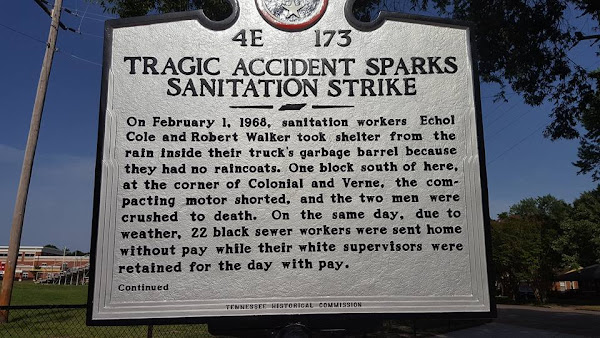The Memphis Sanitation Strike began on February 12, 1968, as a response to the deaths on February 1st of 2 sanitation workers. From the King Institute:
On 1 February 1968, two Memphis garbage collectors, Echol Cole and Robert Walker, were crushed to death by a malfunctioning truck. Eleven days later, frustrated by the city’s response to the latest event in a long pattern of neglect and abuse of its black employees, 1,300 black men from the Memphis Department of Public Works went on strike. Sanitation workers, led by garbage-collector-turned-union-organizer T. O. Jones, and supported by the president of the American Federation of State, County, and Municipal Employees (AFSCME), Jerry Wurf, demanded recognition of their union, better safety standards, and a decent wage.Martin Luther King Jr.'s Mountaintop speech, the last speech he delivered was given here in Memphis during that strike, and he was assassinated here the next day. You can read the full text of that speech here and listen to him in this video:
The union, which had been granted a charter by AFSCME in 1964, had attempted a strike in 1966, but failed in large part because workers were unable to arouse the support of Memphis’ religious community or middle class. Conditions for black sanitation workers worsened when Henry Loeb became mayor in January 1968. Loeb refused to take dilapidated trucks out of service or pay overtime when men were forced to work late-night shifts. Sanitation workers earned wages so low that many were on welfare and hundreds relied on food stamps to feed their families.
On 11 February, more than 700 men attended a union meeting and unanimously decided to strike. Within a week, the local branch of the National Association for the Advancement of Colored People passed a resolution supporting the strike. The strike might have ended on 22 February, when the City Council, pressured by a sit-in of sanitation workers and their supporters, voted to recognize the union and recommended a wage increase. Mayor Loeb rejected the City Council vote, however, insisting that only he had the authority to recognize the union and refused to do so.
The following day, after police used mace and tear gas against nonviolent demonstrators marching to City Hall, Memphis’ black community was galvanized.
It closes with this:
And then I got into Memphis. And some began to say the threats, or talk about the threats that were out. What would happen to me from some of our sick white brothers?
Well, I don't know what will happen now. We've got some difficult days ahead. But it really doesn't matter with me now, because I've been to the mountaintop.
And I don't mind.
Like anybody, I would like to live a long life. Longevity has its place. But I'm not concerned about that now. I just want to do God's will. And He's allowed me to go up to the mountain. And I've looked over. And I've seen the Promised Land. I may not get there with you. But I want you to know tonight, that we, as a people, will get to the promised land!




...history of full of examples of working people being abused.
ReplyDeleteUnions made a big difference.
DeleteI'm not sure we've gotten there yet
ReplyDeleteDefinitely not.
DeleteUnfortunately, the Promised Land seems as far away today as it did when King spoke them those many years ago.
ReplyDeleteI hope those words resound today as we (the citizens of the U.S.) watch as Tyree Nichols is laid to rest and his eulogy is read in the very church King spoke from the night before his death.
The funeral will be later in the day due to icy roads, but it'll be broadcast live.
DeleteHow horrible for those two men seeking shelter to loose their lives in such a grizzly fashion. 1968, 2023, the same battle continues on.
ReplyDeleteIt's shocking that we're still where we are.
DeleteThis is interesting. It shows how one event can lead to another and another, etc. Happy February Nita.
ReplyDeleteRage and violence among police against citizens of color continues. "Protect and serve"? No.
DeleteI've heard that speech a zillion times. And every time it gets to me.
ReplyDeleteYes. Powerful words.
DeleteWow! A bit of history I knew nothing about, the strike. Thank you for sharing this.
ReplyDeleteMost don;t realize why King was in Memphis.
DeleteMLK was a wonderful person who spoke out about what was wrong, and many hated him for it, so sad. Valerie
ReplyDeleteAmen.
DeleteI remember when he was murdered...and the riots. I never knew the background as to why Martin Luther was speaking that day...back the year I graduated. Now I am 71 and things haven't changed very much at all. So sad.
ReplyDeleteIt's tragic :(
Delete